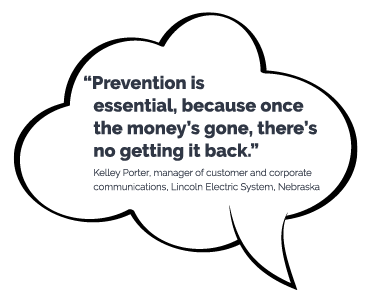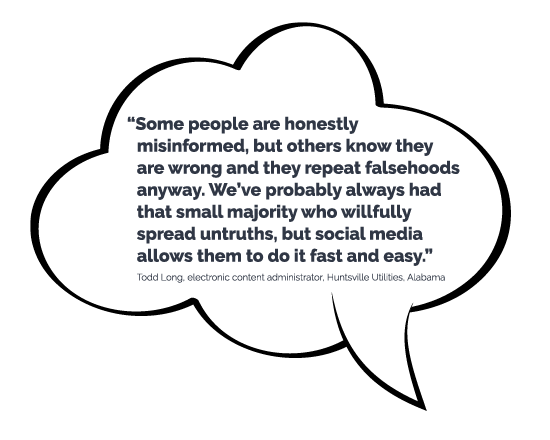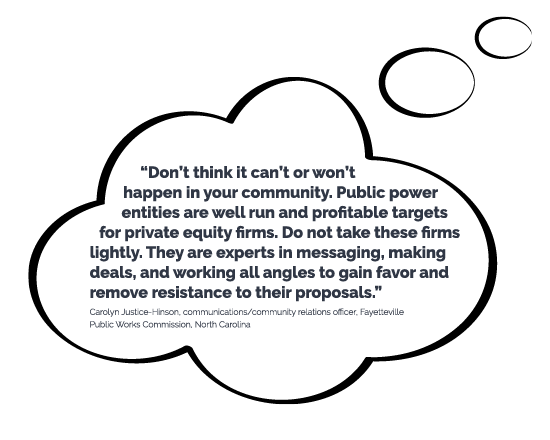There’s no one-size-fits-all solution when responding to misinformation about the utility or its programs. But the utility’s reputation can be a powerful asset.
From dubious claims about the benefits of privatizing a locally owned utility to outright lies that installing rooftop solar will mean the end of electric utility bills, utility messengers must counter and know how to respond appropriately to misinformation.
While the truth can be messy and complicated, the appeal of a lie, or a half-truth, is its simplicity. These days, communicators frequently experience a quip often attributed to Mark Twain: “A lie can travel halfway around the world while the truth is putting on its shoes.” The remark is also often attributed to Winston Churchill and has been traced back to Jonathan Swift. Regardless, it is a magnified truism in the social media age.
The solution is eternal vigilance and ongoing customer education that draws from the utility’s position of expertise about electricity, and that girds understanding about the benefits of public power.
Constant Education
Kelley Porter, manager of customer and corporate communications for Nebraska’s Lincoln Electric System, shared how she deals with three categories of misinformation: those who make honest mistakes, those who shade the truth, and those who seriously misrepresent the truth.
Those who retweet or “like” social media messages about how rooftop solar will mean the end of utility bills are, for the most part, making honest mistakes. They are passing along incorrect information but there’s no harmful intent. It’s the originators of those messages who are shading the truth - and showing up on customers’ doorsteps with elaborate promises and a high-pressure sales pitch.
“We don’t want to come off as anti-solar, and I’m reluctant to use the term ‘solar scams,’ but we do have a group of people going door-to-door misrepresenting the facts in an effort to close a sale,” Porter said.
 The developers in LES’ service area, which includes about 146,000 customers, are telling homeowners that installing rooftop solar panels means they’ll never pay another utility bill in their life. It sounds too good to be true and, of course, it is. Rooftop solar customers still pay a monthly service fee and, unless they shell out additional thousands for battery energy storage, solar customers have no access to self-generation after the sun goes down.
The developers in LES’ service area, which includes about 146,000 customers, are telling homeowners that installing rooftop solar panels means they’ll never pay another utility bill in their life. It sounds too good to be true and, of course, it is. Rooftop solar customers still pay a monthly service fee and, unless they shell out additional thousands for battery energy storage, solar customers have no access to self-generation after the sun goes down.
LES has a multi-faceted solar program that includes community solar, buying a share of the utility’s virtual net metering program, or installing solar panels on homes. The utility also works with a network of solar installers who go through a rigorous education campaign. Only those in the network can offer an LES incentive for solar.
“We work with solar installers who are reputable and honest about payback periods,” she said. But others misstate LES’ plans to raise electric prices, or incentive amounts, as well as a future with no utility bills, to get unwary customers to sign on the dotted line. “There’s only a small number of dishonest installers, but they pose a big threat to our customers, and they’re giving solar a bad name in our community.”
LES started to fight back last year with customer education fliers at the state fair, social media posts, news releases, and website resources. When the bad apples didn’t go away, the utility dialed up a more intensive campaign in 2022, with articles in the customer newsletter, earned media, paid media, an appearance on a sponsored radio show, and warnings on bill envelopes encouraging customers to check with LES before signing a rooftop solar contract.
The campaign’s key message: “Considering solar? Connect with LES to get the facts!”
Porter said the campaign is designed to be like white noise — an always-on effort to reach customers through multiple channels.
“I don’t think we’ll ever be done with this — it’s going to be like payment scams, always morphing with a new hook. So customer education on solar will always have to be an item on our editorial calendar. We’ve developed a ‘go bag’ of communications assets, like 10- and 15-second ads that can be rapidly deployed if we see this resurging.”
LES also is looking into partnering with the state attorney general’s office for added credibility. “Prevention is essential, because once the money’s gone, there’s no getting it back.”
Confronting Untruths
Huntsville Utilities, a three-service community-owned utility in Alabama with about 205,000 customers, has a squeaky wheel problem: the city has experienced sharp increase in demand for electric vehicles, but there are a small number of highly motivated people in the utility’s service area who vehemently oppose EVs, said Todd Long, the utility’s electronic content administrator. The opponents will use any pretext to make their views known, typically on Facebook.
Earlier this year, after Huntsville Utilities announced that Tesla installed 12 superchargers in the city’s new entertainment district, there was “misinformation and downright anger” in Facebook posts about EVs — “way more than what we expected,” he said.
And during the summer, when high heat and humidity caused the Tennessee Valley Authority to initiate an emergency load curtailment, snarky comments were posted to Huntsville’s Facebook page blaming EV owners for the power emergency, claiming they were charging their vehicles during the middle of the day.
“Some people are honestly misinformed, but others know they are wrong and they repeat falsehoods anyway. We’ve probably always had that small majority who willfully spread untruths, but social media allows them to do it fast and easy.”
Long said the utility answers what it felt were “honest mistakes” about electric vehicles — such as that all customers pay for the electricity discharged through public charging stations. “When we explained that EV users are charged for the electricity they use at public charging stations, they say, ‘Oh, I didn’t realize that.’”
“We have the facts on our side, but we know some people aren’t interested in the facts — because we’ve tried to correct them, but they keep repeating untruths.”
Rather than launch a broad customer education campaign, Huntsville has decided to try to keep the issue contained to Facebook. “Facebook is where the fire is, so that’s where we point the water,” he said.
He said the large silent majority in Huntsville either is indifferent to EVs or supports them. “I’m only going to worry about those whose minds I can change,” said Long.
Using Allies
Fayetteville Public Works Commission in North Carolina has been fighting a battle with one arm tied behind its back for several years. It’s still winning.
PWC is the latest public power utility to draw the unsolicited interest of a private equity investment firm, Bernhard Capital Partners, headquartered in Baton Rouge, Louisiana. Other public power utilities targeted by Bernhard include Lafayette Utilities System in Louisiana and JEA in Jacksonville, Florida.
Bernhard first approached Fayetteville’s mayor and city council in mid-2019 with a proposal to help manage PWC, which serves about 119,000 electric, water and wastewater customers.
 Bernhard Capital Partners said its offer could give the city of Fayetteville hundreds of millions of dollars that could be used to make desirable capital improvements. The offer reportedly promised to keep PWC’s leadership in place, and assure that no employee would lose their job.
Bernhard Capital Partners said its offer could give the city of Fayetteville hundreds of millions of dollars that could be used to make desirable capital improvements. The offer reportedly promised to keep PWC’s leadership in place, and assure that no employee would lose their job.
The PWC commission chair said he was not interested, but that did not deter Bernhard, which continued to contact elected officials and utility leadership. In mid-2020, the PWC said it was still not interested, but it signed a non-disclosure agreement to allow the parties to exchange confidential information so the commission could better assess Bernhard’s proposal. At the end of 2020, the commission once again said it was not interested.
The following spring, Bernhard began selectively leaking aspects of its proposal in an attempt to win over local stakeholders.
Elaina Ball, PWC’s CEO, told a local newspaper that the incomplete portrait offered by the private equity firm “may not give the public all of the information they need to understand what a deal like this could mean for their future and future generations.”
Bernhard is no longer pursuing a deal with PWC, but the non-disclosure agreement remains in place, which limits what Carolyn Justice-Hinson, PWC’s communications/community relations officer, can say.
But she did say this: “As soon as public discussions got into the media in the spring of 2021, we learned that Bernhard had hired local political consultants and an ad agency that had a previous working relationship with PWC, so they were, unfortunately, very familiar with our communications/outreach and stakeholders.”
“PWC used general crisis communication methods to proactively reach out to employees, former leadership, vendors, customers and community stakeholders with a clear, consistent message that emphasized the value of public power and PWC’s strong financial position,” Justice-Hinson said. Because of the non-disclosure agreement, messaging had to be handled very carefully. “Press was given the statements, provided relevant information through FOIA requests, and directed to general public information. Employees and all other stakeholders received the statements and information at the same time, so they were prepared with facts if they were involved with anyone in the community.”
PWC asked community stakeholders to be the utility’s eyes and ears so it could stay abreast of what Bernhard was saying in the community. The utility also leveraged relationships with several long-time media partners to help it monitor activities and help position itself favorably. Two local newspapers wrote op-eds early on warning of the proposal and supporting PWC and its current governance and operation, she said.
“PWC has had strong customer communications and community relations/outreach for over 20 years,” Justice-Hinson said. “Our commission and leadership for many years have followed public power’s best practices of explaining the benefits of public power. We support hundreds of organizations annually through sponsorships and in-kind contributions. We annually are the largest United Way campaign in the community. We have a customer newsletter, eblast, TV show, social media, and podcast. We advertise and have strong relationships with more than 15 media organizations. We have a well-established customer advisory group and we actively engage with current members and alumni of the group.”
All of those connections, built over 20 years, have paid off as the community has rallied to PWC’s side.
Now that COVID-related shutdowns have eased, PWC has resumed its community outreach and education, Justice-Hinson said. “We look for new opportunities to educate the community on our leadership, public power, reliability, low rates, and strong financial position. Our new strategic plan includes community engagement as a strategic priority to emphasize to our employees the importance of engagement and demonstrate how it can help our operations in challenging times such as the Bernhard event.”
She offered a warning for other public power utilities: “Don’t think it can’t or won’t happen in your community. Public power entities are well run and profitable targets for private equity firms. Do not take these firms lightly. They are experts in messaging, making deals, and working all angles to gain favor and remove resistance to their proposals.”
“Ongoing community engagement and helping build support and understanding about the benefits of public power and its value is tremendously important. If this isn’t a priority at your utility, it needs to be. We would have been at a huge disadvantage had we not had established engagement, relationships, and communications with community leaders over the last 20 years. We had allies that helped during this time. They helped rally others and be voices when we could not.”
Respond Strategically
Before acting on misinformation or deceptive practices in your community, communicators first need to understand the scope of the problem. If it’s a small fire with a fringe population, best to follow Long’s advice and not overreact. But if the problem is broader and more far-reaching, a strategy with a broad approach is needed.
Before leaping into action, remember that customer responsiveness to utility issues typically falls along a bell-shaped curve: a small percentage, perhaps 15% at each end of the curve, have strong feelings — either positive or negative — about a utility. These segments either will believe everything a utility says, or nothing. Don’t spend a lot of time with those two groups. Instead, if the issue has broad importance to a utility, focus on the persuadable 70% in the middle.
If you give your customer-owners a fair shake, chances are they will stand up for you. For example, after yet another Facebook post from an EV opponent, a Huntsville commenter replied: “Why is it that folks who don't have EVs, don't talk to anyone who owns one or knows anything about them, are so confident about stepping up and making claims that were never true or became false long ago?”

